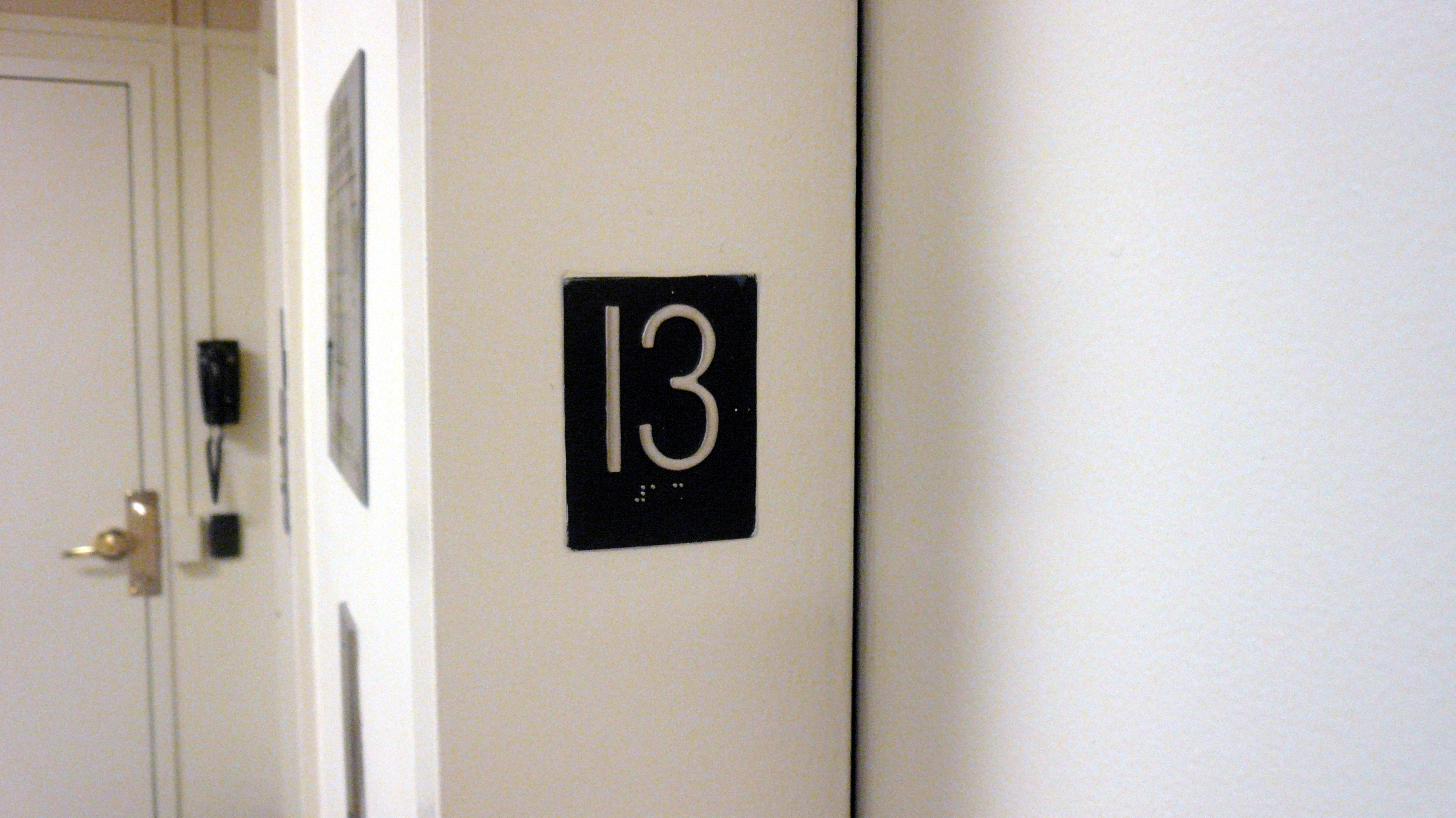Humans assign so much meaning to numbers that superstition affects infrastructure design.
In 1988, The New York Times Magazine ran a piece on a man named J. Ira Harris, who, as the story put it, “is simply crazy about the number 13.” Here’s how “crazy” he is:
Harris’s license plate and his home and office telephones contain 13’s. He was born on April 13th, has often bet successfully on the numbers 1, 3, and 13, and once sent a bill to a client for $1,313,313.13 for an acquisition deal.
Harris isn’t alone in his number-based obsession. Numbers have a strange grasp on people’s lives, thanks to the human tendency to ascribe deeper meaning to numbers. Some people make a wish at 11:11. Others believe that good things come in threes. We celebrate birthdays, anniversaries, sweet 16s. Some numbers are divine (seventh heaven) or are given divine connotations through math (the golden ratio, the Fibonacci Sequence). And, of course, there’s pop culture: James Bond is 007. Jim Carrey did something-or-other with the number 23. The Answer to the Ultimate Question of Life, the Universe, and Everything in The Hitchhiker’s Guide to the Galaxy is… 42, which also happens to be the final number in the sequence in Lost (4, 8, 15, 16, 23, 42). Twelve has found particular significance across cultural fields—there are 12 zodiac signs, 12 months in a year, 12 models of Cylons.
But 13? Thirteen’s cultural meaning is a little more, well, sinister. Though triskaidekaphiliacs like Harris are not unheard of, the number is most often associated with fear or superstition, mostly in Western culture. Thirteen is rooted in negative meaning, which can partly be traced to the Bible (Judas, who betrays Jesus, was the 13th guest at the Last Supper), as well as to pop culture. The horror franchise Friday the 13th capitaliaes on the fear of the date itself, a phobia known asparaskevidekatriaphobia.
From our partners:
It’s enough of a superstition to affect, of all things, the way we number the floors in buildings. This week, the New York City-based housing data and listings firm CityRealty released a list of condos in Manhattan that have a 13th floor. The company found that, out of 629 buildings with 13 or more floors, only 55 labeled the 13th floor as the 13th floor. That means only 9 percent of the condos that actually have 13th floors label them as such. The remaining 91 percent of buildings with 13th floors relabeled them. Some replaced the supposedly unlucky number with another, like 14, or 12B, or 14A. Others rejected numbers completely, using M (the 13th letter), or, if 13 is the top floor, naming it the “penthouse” instead.
As long as the 13th floor isn’t named the 13th floor, it’s no longer unlucky, right?
Of course not. Floors on buildings don’t just disappear. Yet, there are still those 574 condos in Manhattan that avoid calling the 13th floor by its actual number. And those condos vary in size, neighbourhood, and price range.
Some renters ended up not caring too much about living on the 13th floor. Which, as it turns out, is the attitude most buyers and renters have, according to some brokers who represent buildings with 13th floors. They said they’ve never had a problem renting or selling 13th-floor apartments. “I have never had a client reject a 13th-floor apartment,” Alexandra Bellak, a broker with Douglas Elliman Real Estate, wrote in an email, “nor has it come up in conversation.” The grueling apartment-hunting process in Manhattan, plenty of people will tell you, is far scarier than the number 13.
[infobox]Ultimately, it comes down to making sure owners like where they live. “I think they want to feel comfortable in this residence they’re spending money on,” Warshawer says, “and not have any sort of negative association.” If that means omitting the number 13 from the 13th floor itself, then so be it.[/infobox]So why avoid labeling a 13th floor in the first place? CityRealty’s Director of Research and Communications Gabby Warshawer tells it’s a preventative measure, in case any potential buyers or renters are superstitious. Even a slight fear of the number could stop someone from a purchase. “It’s not an issue that the real-estate community is very concerned with,” she admits. “But from the developers’ perspective, even if there’s a .01 percent chance it’ll affect prices, why take a risk at all?”
Besides, she adds, taller buildings are more attractive—and lucrative—in cities like New York, and eliminating the 13th floor is an easy way to give the illusion that a building is a floor taller than it really is. It’s a bit of a cheat, but it’s allowed.
Ultimately, it comes down to making sure owners like where they live. “I think they want to feel comfortable in this residence they’re spending money on,” Warshawer says, “and not have any sort of negative association.” If that means omitting the number 13 from the 13th floor itself, then so be it.
[infobox]The point is: Numbers drive how we see our surroundings in ways that are sometimes encouraging, sometimes discouraging.[/infobox]The missing 13 may seem trivial, but it simply reflects and takes care of a widespread cultural belief. The tweak is comparable to the way some Asian cultures view and deal with the numbers four and eight. In Mandarin Chinese, for example, the pronunciation of the word for “four” (四) and the one for “death” (死) are similar—sì for “four,” sǐ for “death.” On the other hand, the word for “eight” (八), pronounced bā, is close to the word for “prosperity” or “wealth” (发), pronounced fā. This leads to a similar floor-naming struggle in China, where buildings often skip levels with the number four (four, 14, 24, etc.), while levels with the number eight are coveted. Lots of people have personal lucky or unlucky numbers. Even if it does seem silly at times to place so much weight in them, lots of us believe in good and bad luck.
The point is: Numbers drive how we see our surroundings in ways that are sometimes encouraging, sometimes discouraging. They’re a part of our regular lives, making them hard to ignore. Yet in the end, we’re the ones who assign bad or good luck to the numbers we see. Just look at J. Ira Harris today. The investment banker who the Times pegged as crazy for the number 13 has had a long and successful career. Choosing 13 worked out pretty well for him.
This article originally appeared in The Atlantic.














